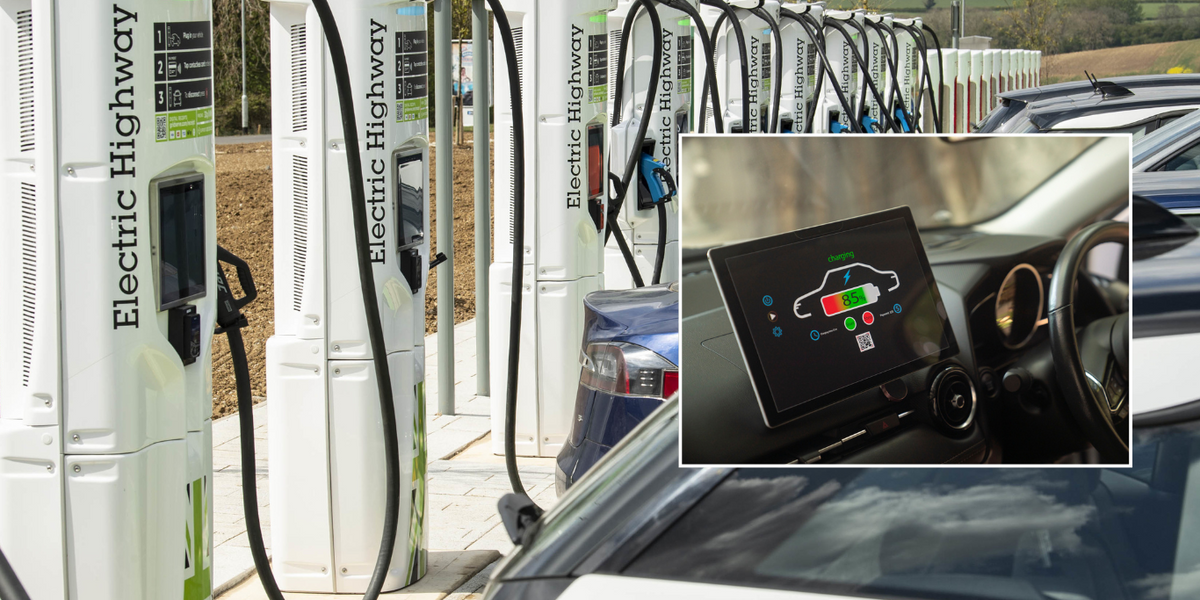Labour has been urged to introduce industry-backed battery health certificates for electric cars, which could boost consumer confidence in zero emission vehicles.
The call comes as the second-hand electric vehicle sector faces challenges with driver trust and misconceptions about battery technology, which are seen as key barriers preventing drivers from giving up their petrol and diesel cars.
The Association of Fleet Professionals has warned that more needs to be done to make drivers have faith in electric vehicles, like they do with petrol or diesel equivalents.
The industry body was among several organisations that signed a British Vehicle Rental and Leasing Association (BVRLA) open letter last week requesting more Government support for electrification in the used car sector.
Do you have a story you’d like to share? Get in touch by emailingmotoring@gbnews.uk
The Association of Fleet Professionals has called for battery health checks to be introduced for EVs
PA/GETTY
Ric Baird, board director at the AFP, said: “What is perhaps receiving less attention, although included in the letter, is the need to create more consumer confidence in used EVs, overcoming the real hurdles that exist as well as the large number of distortions and half-truths in circulation.
“There is an argument that generating a sense of everyday normality and absence of risk around EVs is as important as any financial considerations.”
The AFP said that establishing the long-term reliability of EV batteries and making charging as economical and accessible as possible would be key confidence-boosting factors.
The organisation added that to create a successful EV market, it requires inspiring confidence not just among consumers but car dealers, many of whom remain reluctant to handle used electric vehicles.
“There is a huge amount of misinformation around about EV batteries, ranging from their supposed propensity to self-combust to the speed at which they degrade,” Baird noted.
However, he stated that all the available evidence now shows electric cars to be “stable, robust and long-lasting”, which needs to be communicated.
The AFP director emphasised that an industry-backed battery health check is urgently needed to reassure consumers.
Labour had previously promised in its manifesto to introduce such checks to increase interest in electric vehicles.
The party detailed how it would be “supporting buyers of second-hand electric cars by standardising the information supplied on the condition of batteries”.
Research from AXA UK, published in March, showed that battery health certificates could play a significant role in stimulating the UK’s used EV market by providing a measure for vehicle value that doesn’t currently exist.
The certificates would provide consistency in battery health information for all makes and models of used EVs, giving consumers more confidence in the longevity of the vehicles they are buying.
AXA explained how the certificates could have a positive impact on insurance premiums by making it easier for insurers to accurately assess the value of second-hand EVs in a similar way that mileage is used for vehicles with an engine.
A survey by AXA and Aviloo found that 63 per cent of drivers have no plans to buy an electric car, with 37 per cent citing concerns over battery life as a barrier. Only eight per cent of surveyed drivers would consider buying a second-hand electric vehicle.
LATEST DEVELOPMENTS:
Labour promised in its manifesto to introduce certificates for used electric cars
AXA
Marco Distefano, Managing Director of AXA Retail, shared: “We urge the Government to urgently publish guidelines to support standardised battery health testing.
“Not only will this stimulate the used EV market, but it also has the potential to positively impact insurance premiums by providing a barometer for assessing the value of EVs in a similar way that mileage is used for vehicles with an engine.”

